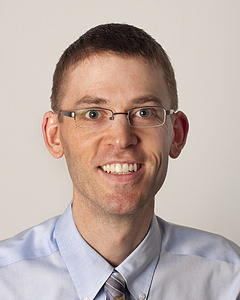 Want to reduce your stress? Try forgiveness.
Want to reduce your stress? Try forgiveness.
Loren Toussaint, professor of psychology at Luther College, explains how forgiving yourself and others can lead to a more harmonious life.
Toussaint earned his Ph.D. in 1998. After his postdoctoral trainee experience at the University of Michigan, he served as an assistant professor at Idaho State University for three years (2001–4). “I taught undergraduates and graduate students in masters and Ph.D. programs and I loved it. But it was Idaho, not Iowa.”
Toussaint acknowledges that his postdoctoral experience took an additional two years to complete after an already long Ph.D. program of study. Upon reflection, he feels it was well worth it. “It was during that time that I found my passion and learned about the kind of scholar I wanted to become,” he says. “I had good mentors in graduate school and as a postdoctoral fellow. They were invaluable to me and prepared me well for a career as a professor. I continue to write and talk with them regularly.”
The take-home message for students is, don’t hurry through your training. “Take your time, invest in the experience, and forge lifelong relationships with your teachers and mentors,” he says. “It cost me two years of earnings to do my post-doc, but it has paid annual dividends, so-to-speak, ever since. Invest early and heavily in experiences and relationships that will yield career-long returns.”
Forgiveness
We are often hurt by other people and just as frequently we return the favor. Forgiveness of others and oneself both involve reducing negative thoughts, feelings and behaviors and instead promoting the positive variety at yourself or another offender. This doesn’t imply condoning, denying, or excusing wrongdoing, and it may or may not involve making up with someone or getting justice. But it is worthwhile.
Forgiveness of others and oneself can have remarkable benefits. For instance, we have found that forgiving others was directly related to less stress and symptoms of mental and physical illness. We also found that the most forgiving individuals didn’t show the usual association between stress and worse mental health. Similarly, in another recent study we found that the most self-forgiving individuals did not show the usual association between hostility and worse cognitive function. Both types of forgiveness are directly linked to health and buffer the effects of stress on health, and both likely help us feel better by helping us cope with common interpersonal stress and conflict.
When learning of the benefits of forgiving others and oneself, it’s common to want to learn how to become a more forgiving person. We’ve found that prayer, mediation, and journaling are good ways of promoting forgiveness, but developing empathy for others and self-compassion are also important. Educational forgiveness programs too are effective in increasing forgiveness of others and oneself, and these programs also have health benefits. It really is true that learning to forgive can help improve the life you live.

Comments
4 responses to “Loren Toussaint, Luther College – Forgiveness”
Great advice, but it is very difficult to forgive someone for the trauma associated with prolonged workplace bullying and mobbing.
Good point Thomas! Email/call me and I’d love to talk. And, please visit my website: http://www.luther.edu/touslo01. Our research suggests that, hard as it is, if you can forgive at work it is of benefit. Not to say it isn’t hard. Perhaps one of the hardest places to forgive because of justice issues and power differentials.
If this helps at all, I try to remember that everyone does what they do for a reason. If they do something negative, it’s probably because of some trauma in their past: Insecurities, abuse (in whatever capacity), having the same experience they’re now causing you to have. It could be any number of factors, but the point is hurtful people are hurt people. Seeing them as a confused person lashing out instead of an inherently spiteful person helps me put myself in their shoes. Maybe the people bullying me at work get to me so much that when I come home I’m short with the people I love. It’s not as if my loved ones deserve it, and yet I find myself able to apologize and forgive myself with time. I doubt your coworkers will ever apologize, but it’s a hard thing to do, so maybe just keep in mind the very likely scenario that they might want to apologize but don’t know how, and probably lash out because of pain that isn’t going to be visible to someone at work like yourself. We all have something eating at us a little. Some more than others probably. Maybe even the bullies most. I don’t know, I hope this helps. It’s all about perspective. Shalom.
Wonderful reflection and perspective, Enoch. Thanks for sharing this. I learned a lot.